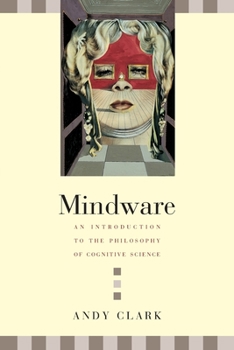Mindware: An Introduction to the Philosophy of Cognitive Science
Select Format
Select Condition 
Book Overview
Mindware: An Introduction to the Philosophy of Cognitive Science invites readers to join in up-to-the-minute conceptual discussions of the fundamental issues, problems, and opportunities in cognitive science. Written by one of the most renowned scholars in the field, this vivid and engaging introductory text relates the story of the search for a cognitive scientific understanding of mind. This search is presented as a no-holds-barred journey from early work in artificial intelligence, through connectionist (artificial neural network) counter-visions, and on to neuroscience, artificial life, dynamics, and robotics. The journey ends with some wide-ranging and provocative speculation about the complex coadaptive dance between mind, culture, and technology.
Each chapter opens with a brief sketch of a major research tradition or perspective, followed by short yet substantial critical discussions dealing with key topics and problems. Ranging across both standard philosophical territory and the landscape of cutting-edge cognitive science, Clark highlights challenging issues in an effort to engage readers in active debate. Topics covered include mental causation; machine intelligence; the nature and status of folk psychology; the hardware/software distinction; emergence; relations between life and mind; the nature of perception, cognition, and action; and the continuity (or otherwise) of high-level human intelligence with other forms of adaptive response. Numerous illustrations, text boxes, and extensive suggestions for further reading enhance the text's utility. Helpful appendices provide background information on dualism, behaviorism, identity theory, consciousness, and more. An exceptional text for introductory and more advanced courses in cognitive science and the philosophy of mind, Mindware is also essential reading for anyone interested in these fascinating and ever-changing fields.
Each chapter opens with a brief sketch of a major research tradition or perspective, followed by short yet substantial critical discussions dealing with key topics and problems. Ranging across both standard philosophical territory and the landscape of cutting-edge cognitive science, Clark highlights challenging issues in an effort to engage readers in active debate. Topics covered include mental causation; machine intelligence; the nature and status of folk psychology; the hardware/software distinction; emergence; relations between life and mind; the nature of perception, cognition, and action; and the continuity (or otherwise) of high-level human intelligence with other forms of adaptive response. Numerous illustrations, text boxes, and extensive suggestions for further reading enhance the text's utility. Helpful appendices provide background information on dualism, behaviorism, identity theory, consciousness, and more. An exceptional text for introductory and more advanced courses in cognitive science and the philosophy of mind, Mindware is also essential reading for anyone interested in these fascinating and ever-changing fields.
Format:Paperback
Language:English
ISBN:0195138570
ISBN13:9780195138573
Release Date:December 2000
Publisher:Oxford University Press
Length:224 Pages
Weight:0.76 lbs.
Dimensions:0.5" x 6.1" x 9.2"
Customer Reviews
2 ratings
Great Book, But No Introduction
Published by Thriftbooks.com User , 17 years ago
First, let me say, I took so much from this book. I'm a cognitive science major myself and there were ideas in this book that hadn't ever come to my attention. I would like to say, however, that the chapter on connectionism didn't do the topic justice. Also, the book's chapters on the whole tend to mesh together to build up to the author's personal philosophical paradigm, extended mind hypothesis and largely embodied cognition (which is what most cognitive scientists believe). I find that in doing this, however, the reader misses out on the history and therefore context that these competing paradigms share. Second, although this is a great book, I'm not sure I could recommend it to a layman audience. For that reason (not being as the title says, an introduction) I deducted one star from the review. However, if there's any philosophers of the mind, psychologists, biologists, or just curious people out there, I'd recommend this book to read for cognitive science (also, it helps a lot, for undergrad cog sci majors to give this a read before entering into your first cogs class).
Great Overview of Cognitive Science
Published by Thriftbooks.com User , 21 years ago
This book was recommended to me by a cognitive scientist researcher at my university as the single best thing I could read to obtain an up-to-date overview of what's going on in cognitive science. The book lived up to this promise. I found it an excellent, scientifically and philosophically informed, treatment of this topic.






